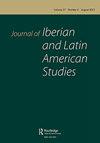巴拉圭传教中Guaraní中爱的政治语言(1750-1810)
IF 0.3
0 HUMANITIES, MULTIDISCIPLINARY
Journal of Iberian and Latin American Studies
Pub Date : 2022-05-04
DOI:10.1080/14701847.2022.2094626
引用次数: 0
摘要
我们的假设是,在巴拉圭的耶稣会传教中,语言为Guaraní的印度当局将中世纪的爱的政治概念与他们自己的所有权和占有他人的概念联系起来,而耶稣会士认为他们在Guaraní动词ayhu中找到了与他们的爱的概念完全等同的概念。我们表明,这是一个“双重身份错误”的例子,但它仍然是富有成效的,因为它在很长一段时间内,在Guaraní-speaking社会中确立了某种不对称的相互爱的概念。为了进行演示,我们重新阅读了Tupí-Guaraní上最近的史前史和人类学作品,并分析了1750年至1810年间印度传教当局在Guaraní上写的文件,我们作为一个团队对这些文件进行了古文字记录、音译和翻译,并将其翻译成一个开放访问的数据库,该数据库可在www.langas.cnrs.fr上找到。本文章由计算机程序翻译,如有差异,请以英文原文为准。
The political language of love in Guaraní in the missions of Paraguay (1750–1810)
ABSTRACT Our hypothesis is that in Paraguay’s Jesuit missions the Indian authorities, whose language was Guaraní, identified the medieval political concept of love with their own conceptions of ownership and possession of others, while the Jesuits thought they had found the exact equivalent of their conceptions of love in the Guaraní verb ayhu. We show that this was a case of “double mistaken identity,” but that it was nonetheless productive in that it entrenched, for a very long time, a certain conception of asymmetrical mutual love in Guaraní-speaking societies. To conduct our demonstration we reread recent works in Tupí-Guaraní prehistory and anthropology and analysed documents written in Guaraní by mission Indian authorities between 1750 and 1810, which as a team we paleographed, transliterated, and translated for a open-access database, available at www.langas.cnrs.fr.
求助全文
通过发布文献求助,成功后即可免费获取论文全文。
去求助
来源期刊

Journal of Iberian and Latin American Studies
HUMANITIES, MULTIDISCIPLINARY-
CiteScore
0.40
自引率
33.30%
发文量
23
 求助内容:
求助内容: 应助结果提醒方式:
应助结果提醒方式:


